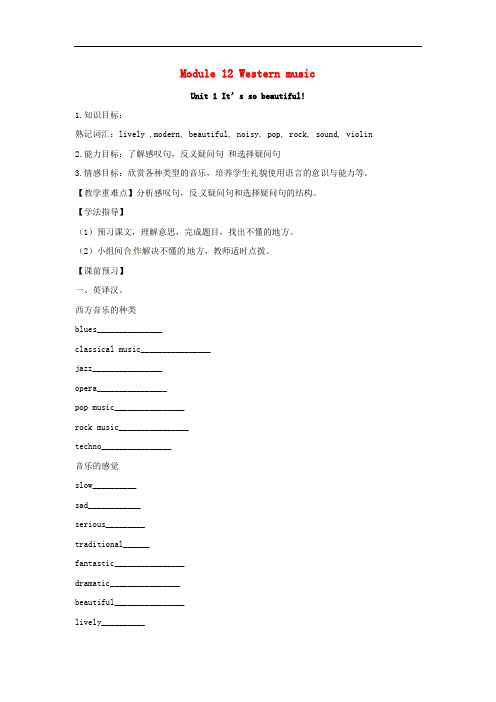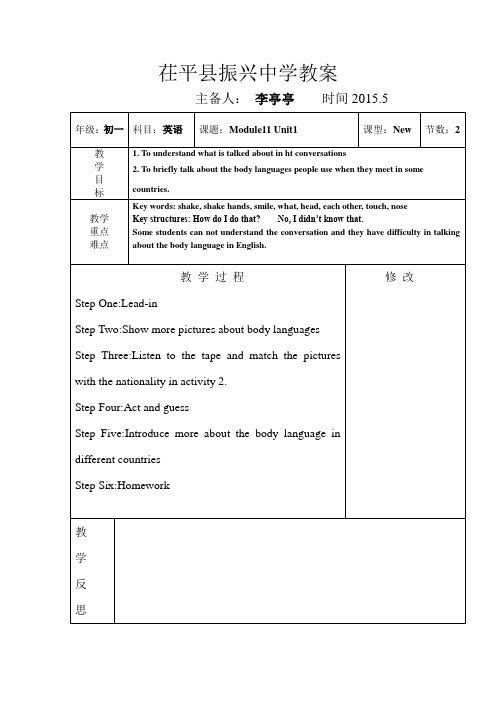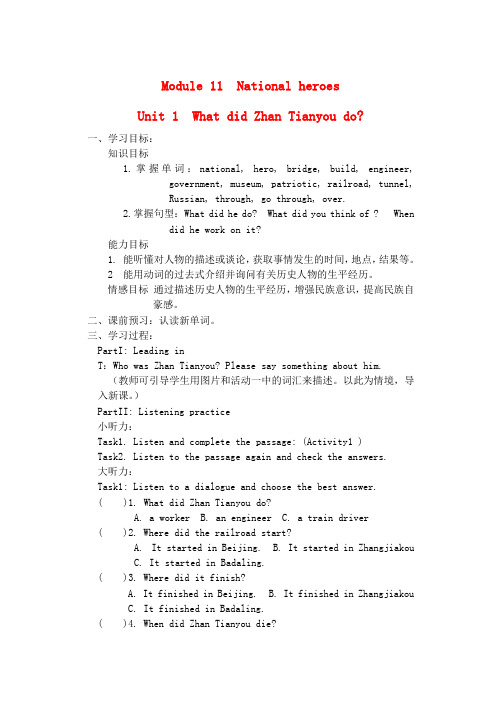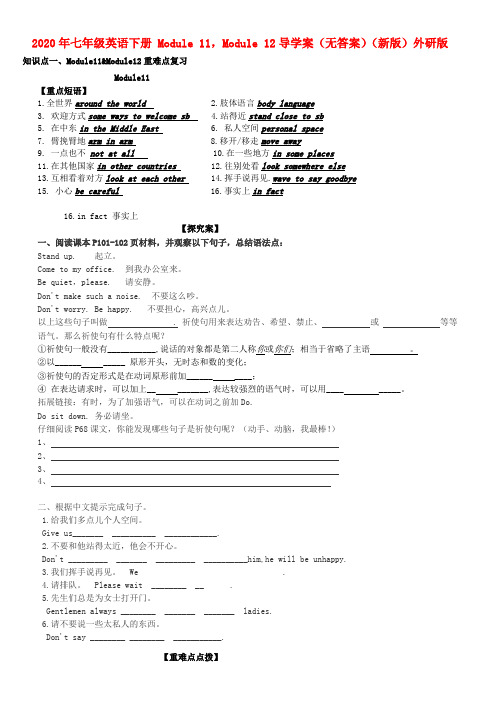七级英语下册 Module 11,Module 12导学案外研版
- 格式:doc
- 大小:81.00 KB
- 文档页数:5

Module 12 Western musicUnit 1 It’s so beautiful!1.知识目标:熟记词汇:lively ,modern, beautiful, noisy, pop, rock, sound, violin2.能力目标:了解感叹句,反义疑问句和选择疑问句3.情感目标:欣赏各种类型的音乐,培养学生礼貌使用语言的意识与能力等。
【教学重难点】分析感叹句,反义疑问句和选择疑问句的结构。
【学法指导】(1)预习课文,理解意思,完成题目,找出不懂的地方。
(2)小组间合作解决不懂的地方,教师适时点拨。
【课前预习】一、英译汉。
西方音乐的种类blues_______________classical music________________jazz________________opera________________pop music________________rock music________________techno________________音乐的感觉slow__________sad____________serious_________traditional______fantastic________________dramatic________________beautiful________________lively__________noisy__________modern____________二、反意疑问句的定义:1.反意疑问句又叫附加疑问句,是指当提问的人对前面所叙述的事实不敢肯定,而需要向对方加以证实时所提出的问句。
2.结构为:前一部分是一个陈述句,后一部分是一个简单的问句(助动词/情态动词或系动词be(肯定或否定)+主语(代词)3. 反意疑问句构成应注意以下几点:①前面的陈述句如果是肯定的,反意疑问句就要用否定形式;如果是否定的,反意疑问句就用肯定形式。


Module 11 National heroesUnit 1 What did Zhan Tianyou do?一、学习目标:知识目标1.掌握单词:national, hero, bridge, build, engineer,government, museum, patriotic, railroad, tunnel,Russian, through, go through, over.2.掌握句型:What did he do? What did you think of ? Whendid he work on it?能力目标1. 能听懂对人物的描述或谈论,获取事情发生的时间,地点,结果等。
2 能用动词的过去式介绍并询问有关历史人物的生平经历。
情感目标通过描述历史人物的生平经历,增强民族意识,提高民族自豪感。
二、课前预习:认读新单词。
三、学习过程:PartI: Leading inT:Who was Zhan Tianyou? Please say something about him.(教师可引导学生用图片和活动一中的词汇来描述。
以此为情境,导入新课。
)PartII: Listening practice小听力:Task1. Listen and complete the passage: (Activity1 )Task2. Listen to the passage again and check the answers.大听力:Task1: Listen to a dialogue and choose the best answer.( )1. What did Zhan Tianyou do?A. a workerB. an engineerC. a train driver( )2. Where did the railroad start?A.It started in Beijing.B. It started in ZhangjiakouC. It started in Badaling.( )3. Where did it finish?A. It finished in Beijing.B. It finished in ZhangjiakouC. It finished in Badaling.( )4. When did Zhan Tianyou die?A. In 1905B. In 1909C. In 1919Task2: Listen to the dialogue again and answer the questions.1. When did Zhan Tianyou work on the railroad?2. What did the Chinese do when he died?3. W hy didn’t the government want foreign engineers? PartIII. 合作探究 (先自主完成,后小组合作,交流学习成果,共同释疑)1.What did you think of the film of the film about Zhan Tianyouon television last night?(1)用来询问某人对某一事物的看法经常说:______do you ___________?过去时态经常说:____________ you __________?还有一种方法是:_______ do(did) you _______?如:你觉得我们的新老师怎么样?可以说:_______do you _________ our new teacher?也可以说: _______ do you _________ our new teacher?(2) 在电视上:__________________(3) 昨天晚上:______________ 也可以说:______________2. When did he work on it?work on 是动词短语,意思是:从事于,演算等。

【课型】:读写课【学习目标】1、知识目标:本单元的词汇,感叹句和选择疑问句2.能力目标:能读懂有关音乐及人物描写方面的文章,掌握介绍人物的方法。
3.情感目标:培养礼貌使用语言的能力,表达不同意见时顾及他人的感受。
【学法指导】自主预习,合作探究?课文课文102-103页模块12感叹句和选择疑问句。
【学习重难点】感叹句和选择疑问句【课前自主预习—思考】一.大声朗读课文的对话,自主找一找对话里出现的感叹句和选择疑问句,并理解其用法。
二、预习课文,完成下列的词组翻译。
(来做个小小翻译家哦)1.European_____________2. musician ____________3. composer________________4. classical music ___________5. elder____________6. century______________7. 华尔兹舞(曲)___________________ 8. 舞曲______________9. 又一个;再一个____________________ 10。
完美的_________________11(写作、音乐或艺术的)作品_____________ 12. 贫穷的_________________13.美丽又古老的城市_________________________ 14.重要的_____________15他是一位了不起的欧洲音乐家。
___________________________________________三、阅读文章,尝试完成课文75页的相应的活动。
【小组合作探究】让我们一起走进知识的殿堂吧!(课内知识探究)1. His dance music made him famous all over Europe.他的舞曲使他享誉全欧洲。
【探究一】make 的常见用法:(1) make sb. do sth. 使某人做某事make sb. not do sth. 使某人不做某事Parents always__________________________many things. 父母总是使他们的孩子学习很多东西。

Module 12 A holiday journey预习学案一.预习目标:1.key vocabulary—on holiday, journey, have a good time, meet, spend.2.key structures—past simple irregular verbs.二.预习提纲:(一)预习新单词1. 根据音标自读单词,后听录音,跟读单词,纠正发音,在自读单词,后限时速读,限时速记。
2. 词汇预习效果检测:连线spend 在度假clock 买东西hope 时钟on holiday 奶奶;外婆[granny的缩略]newspaper 花费tomorrow 希望do some shopping 报纸gran 明天,在明天(二)预习不规则动词过去式1.回忆:规则动词过去式变化规则1)一般动词词尾加; 如:walk—wlaked listen—look—finish—2)以字母e 结尾的,词后加如:Live—notice—decide—take—3)以辅音字母加-y结尾的动词,如:Hurry—carry—2. 找出本模块出现的不规则动词的过去式:be—have—swim —buy—leave—spend—come—meet—take—do—read—write—get—send—go —see—组内核对答案,修正后快速记住,组内相互检查,看谁记得又快又好。
(三)预习句型1)阅读并试翻译短文,划出其中的特殊疑问句。
如:How long did it take to get there ?组内合作,一问一答,反复朗读,直至背诵。
write questions:Where/they/take a flight to?( Hong Kong)Where did they take a flight to? They took a flight to HongKong.1.Why/they/go there?(for a holiday)2. When/they/leave?(early in the morning)3.What/he/read on the plane?(a newspaper)4 .What/she/drink?(an orange juice)5.When/they/get there?(at 1:00).三反馈检测(一)词汇:根据汉语能说出英语即可。

2020年七年级英语下册 Module 11,Module 12导学案(无答案)(新版)外研版知识点一、Module11&Module12重难点复习Module11【重点短语】1.全世界around the world2.肢体语言body language3. 欢迎方式some ways to welcome sb4.站得近stand close to sb5. 在中东in the Middle East6. 私人空间personal space7. 臂挽臂地arm in arm 8.移开/移走move away9. 一点也不not at all 10.在一些地方in some places11.在其他国家in other countries 12.往别处看look somewhere else13.互相看着对方look at each other 14.挥手说再见.wave to say goodbye15. 小心be careful 16.事实上in fact16.in fact 事实上【探究案】一、阅读课本P101-102页材料,并观察以下句子,总结语法点:Stand up. 起立。
Come to my office. 到我办公室来。
Be quiet,please. 请安静。
Don't make such a noise. 不要这么吵。
Don't worry. Be happy. 不要担心,高兴点儿。
以上这些句子叫做 . 祈使句用来表达劝告、希望、禁止、或等等语气。
那么祈使句有什么特点呢?①祈使句一般没有___________,说话的对象都是第二人称你或你们;相当于省略了主语。
②以______ _____ 原形开头,无时态和数的变化;③祈使句的否定形式是在动词原形前加______ ____;④在表达请求时,可以加上__ _______,表达较强烈的语气时,可以用____ _____。
2012外研版英语七年级下册全册Module1—Module12导学案班______ 姓名_____________Module1 Lost and FoundUnit1 Whose bag is this?1.(1) welcome back to + 地点名词: 欢迎回到某地。
Welcome back to school / China / the zoo.(2) welcome back +地点副词(不带to)。
Welcome back home . 欢迎回家。
(3) welcome也可作名词,意为“欢迎”。
give sb. a warm welcome 热烈欢迎某人Let’s give Daming a warm welcome.2.辨析:everyone 和every one(1) everyone作不定代词,意为“每个人”,只指人,不指物,不与of短语连用。
everyone在句中作主语时,谓语动词要用第三人称单数形式。
Everyone ______ (be) here today. 今天每个人在这。
(2) every one既可以指人,也可以指物,可与介词of连用: every one of +人/ 物。
1) Every one of us has a book. _________________________________2) Every one of the apples is red. _______________________________3.first of all: 首先:第一,一般位于句首作状语,强调首要的事情或动作。
First of all, let’s sing a song together. ___________________________________4.look in:朝里看Please look in the bedroom.look at看一看look like看起来像look for寻找5.(1) a lot of = lots of:许多的;大量的, 可修饰可数名词复数或不可数名词,相当于many或much.1) 在桌子上有许多的苹果。
【课型】:听说课【学习目标】1、知识目标:本单元的词汇,感叹句和选择疑问句2.能力目标:能听懂别人对音乐的描述,能够流利谈论自己喜欢的音乐。
能初步掌握感叹句和选择疑问句的用法。
3.情感目标:培养礼貌使用语言的能力,表达不同意见时顾及他人的感受。
【学法指导】自主预习,合作探究。
【学习重难点】感叹句和选择疑问句【课前自主预习—小组内疑难解答】1)、预习单词表,完成下列的词组翻译。
(来做个小小翻译家哦)1 pop music2 rock3 blues4 rap5 waltz6 opera7 jazz8 violin9 piano 10 drum 11 dance music 12 lively13 modern 14 noisy 15 classical 16完美的17 Western 18 sad 19 sound 20 voice21 composer 22 musician23.多么漂亮的一个城市_________________________2)How many kinds of music do you know and how about your feeling when you listen?1 rock music ( noisy )2 ( )3 ( )4 ( )5 ( )6 ( )3)Write down some western famous musicians and his works .(小组互助完成,上网查资料) 1234导学过程1 Check the previewing case .(英语组长检查单词预习案,组员汇报预习情况)2 Lead in ( play different kinds music )Try to say the kinds/types(种类) of music you hear and talk about your feeling in groupsa, It is pop music ,isn’t it?b, Is it rap or jazz?c, How beautiful it is !3 listen and answer the questions about the conversation .1 which modern music does Tony like ?A pop and rock musicB rapC opera2 Which music does Tony’s dad think is too noisy ?A traditional Western musicB pop musicC bluesNow listen again and check . And then check in groups.4Some western famous musicians and his works .Show us in groupsVienna (维也纳)a famous classical composer(古典的) (作曲家)(著名的)was born (出生)Austria (奥地利)Austrian (奥地利人){Strauss (施特劳斯)Famous for :--It ’s by ….--Who ’s it by?这是谁创作的?The Blue Danube 《蓝色多瑙河》Beethoven (贝多芬)--Who’s it by?--It ’s by ….Fate 《命运》 a famous classical composer(古典的) (作曲家)(著名的)was born (出生)Germany (德国)German (德国人){5, Listen and read.6 Read the conversation in groups (组长检查阅读情况,并举手向同学,老师请教)7 Read the conversation in groups in roles ( 比一比,赛一赛,谁是优胜组)Practice like this:--What music do you like? Why?--I like pop. It’s lively and good to dance to. But I don’t like opera. I think it’s too boring. What about you?尝试完成课文72-73页的相应的活动。
Module 12 Western music Unit 1 It’s so beautiful 审核人:初一备学习目标:1. 掌握本单元的单词:lively, modern, noisy, pop, rock, sound, violin, through, both, opera, voice, drum, believe.2.能听懂以音乐和音乐家为话题的听力材料。
【随堂导学】知识点一:一般现在是的被动语态教材原文:This is called The Blue Danube. 这首乐曲叫《蓝色多瑙河》。
本句中的is called 是一般现在是的被动语态,表示“被称为;被叫作”。
一般现在是的被动语态结构是“be+过去分词”。
例如:The lion is called the king of beasts. 狮子被称为百兽之王。
The knife is used to cut things. 刀是用来切东西的。
练习:( )(2018湖南岳阳中考)Our classroom by students every afternoon.A. is cleanedB. was cleanedC. cleans知识点二:反义疑问句的用法教材原文:Y ou listen to pop music, Lingling, don’t you? 玲玲,你听流行音乐,是吗?如果陈述部分是肯定结构,反意疑问部分要用否定结构;反之,如果陈述部分是否定结构,反意疑问部分要用肯定结构。
在附加问句中,主语要用对应的人称代词。
例如:He is at home now, isn’t he? 他现在在家,是吗?Mike doesn’t like swimming, does he? 迈克不喜欢游泳,是吗?注意:陈述部分含有hardly, never, few, little, nothing 等表示否定意义的词时,其反意疑问部分应用肯定形式。
外研版七年级英语下册模块导学案Module 12 Western Music班级:______________ 姓名:_______________Unit 1 It’s so beautiful !一、重点词汇:活泼的现代的吵闹的流行的摇滚乐小提琴西方的两者,两个声音歌剧相信鼓…的首都流行音乐摇滚乐二、核心句型:1.嗯,这是西方音乐,是吗?Hmm, this is Western music , __________ _________ ?2.这是斯特劳斯创作的还是莫扎特?Is this ________________ Strauss or Mozart ?3.你喜欢传统的西方音乐还是流行音乐?___________ __________ ___________ traditional Western music _________ pop music ?4.这叫《蓝色多瑙河》This ___________ ____________ The Blue Danube .三、关键语法:A . 在横线上填写what 或how , 构成感叹句:1. ____________ a beautiful girl she is !2. ____________ fast you run !3. ____________ a nice day !4. ____________ difficult the question is !5. ____________ good news it is !6. ____________ important the topic ( 话题) is !B . 完成下面的反意疑问句:7. Miss Wang works in the library , __________________ ?8 . She is French , __________________ ?9 . You are busy , ___________________ ?10. They do their homework , ______________________ ?11. You will like the story , ___________________ ?12. These are my books . ____________________ ?13. He isn’t reading book .____________________ ?14. There is a card on the table , ___________________ ?15. They helped me . ___________________ ?Unit 2 Vienna is the centre of European classical music .一、重点单词、短语:音乐家经典的又一个欧洲的年长完美的在……的中心遍及不仅……而且带领某人参观数以百计的二、核心句型:1.在斯特劳斯家族,有两个名叫约翰.斯特劳斯的作曲家,他们是两父子。
2013年七年级英语下册 Module 11,Module 12导学案(无答案)(新版)外研版知识点一、Module11&Module12重难点复习Module11【重点短语】1.全世界around the world2.肢体语言body language3. 欢迎方式some ways to welcome sb4.站得近stand close to sb5. 在中东in the Middle East6. 私人空间personal space7. 臂挽臂地arm in arm 8.移开/移走move away9. 一点也不not at all 10.在一些地方in some places11.在其他国家in other countries 12.往别处看look somewhere else13.互相看着对方look at each other 14.挥手说再见.wave to say goodbye15. 小心be careful 16.事实上in fact16.in fact 事实上【探究案】一、阅读课本P101-102页材料,并观察以下句子,总结语法点:Stand up. 起立。
Come to my office. 到我办公室来。
Be quiet,please. 请安静。
Don't make such a noise. 不要这么吵。
Don't worry. Be happy. 不要担心,高兴点儿。
以上这些句子叫做 . 祈使句用来表达劝告、希望、禁止、或等等语气。
那么祈使句有什么特点呢?①祈使句一般没有___________,说话的对象都是第二人称你或你们;相当于省略了主语。
②以______ _____ 原形开头,无时态和数的变化;③祈使句的否定形式是在动词原形前加______ ____;④在表达请求时,可以加上__ _______,表达较强烈的语气时,可以用____ _____。
拓展链接:有时,为了加强语气,可以在动词之前加Do.Do sit down. 务必请坐。
仔细阅读P68课文,你能发现哪些句子是祈使句呢?(动手、动脑,我最棒!)1、2、3、4、二、根据中文提示完成句子。
1.给我们多点儿个人空间。
Give us_______ __________ ____________.2.不要和他站得太近,他会不开心。
Don't _________ _______ _________ __________him,he will be unhappy.3.我们挥手说再见。
We .4.请排队。
Please wait ________ __ .5.先生们总是为女士打开门。
Gentlemen always ________ _______ _______ ladies.6.请不要说一些太私人的东西。
Don't say ________ ________ ___________.【重难点点拨】1, People kiss three times,left,right,left.time 不可数名词,意为时间,不能加“S”。
time 加“s”中文意思是:次数,回,倍数。
Eg : I have a lot of time to do this work.I have been to the Great Wall three times.【拓展延伸】次数的表达法:一次 once,两次 twice,三次以上:基数词+times。
【及时巩固】根据中文提示完成句子。
1.自从这周以来,我们已经见面三次了。
We have met _______________________ since this week.2.不要浪费太多时间在电脑游戏上。
Don't waste ________________________on computer games.3.他一年回家乡四次。
He came back his hometown _______________________.4.我没有花时间在这上面。
I spent ___________ on this.5. Lily的房间是她的三陪大。
Lily's room is _________________ than hers.2.We chinese often shake hands and smile when we meet visitors.Shake hands with 意为和。
握手。
Eg. I shake hands with my new friend.3.In Britain many people don't like other people to touch them at all.not .. at all 意为: 一点也不EG: I don't like Maths at all.【及时巩固】1.我们一点也不想呆在那儿。
We don't want __________ there _____________.2.她一点也不能早起。
She ________ get up early _________.4.In fact, It's very rude!In fact 意为:事实上。
【及时巩固】1.事实上,我们是朋友。
_______________, We are friends.2.事实上,他们已经到达校门口了。
______________, They have __________ the school gate.【训练案】一、根据首字母完成单词1)Our new f___ ____ students are going to arrive very soon.2)Please give them more p___________space.3)South Americans sometimes h__________your arm when they talk to you.4)In some places, it's p__ ______ to look at people when you talk.5)In other countries, it's r____ __ to look at people when you talk.6)W___ ___ to say goodbye is all right in China.二、单项选择()1. The TV is too loud. Please________.A. turn it downB. to turn it downC. turn down itD. to turn down it()2. _______ late again, Bill!A. Don't to beB. Don't beC. Not beD. Be not()3. _______ cross the road until the traffic lights turn green.A. NotB. Won'tC. Doesn'tD. Don't()4. Kate, _______ your homework here tomorrow.A. bringB. bringsC. to bringD. bringing()5. Don't you know that _______ is good for our health?A. swimB. swimmingC. swamD. swims三、句型转换1. Will you please read it again more slowly? (改为祈使句)__ ___ __ ___ again more slowly, please.2. If you don't listen to me, I'll go. (改为同义句)__ ___ __ ___ me, or I’ll go.3. The teachers often tell the students not to be careless(粗心的). (改为祈使句)__ ___ __ ___careless, please.4. Please sit next to Nancy. (改为否定句)___ __ __ ___ next to Nancy.Module 12【重点短语】西方音乐western music 使他成名make him famous它是由谁创作的?who is it by它是由李云迪创作的It’s by Li Yundi. 生于某地be born in a place休息have a break/rest在边缘on the edge of兼职工作a part-time job属于belong to 不但,而且not only … but (also)…受…欢迎be popular with带某人浏览/参观某地take/show sb around随着音乐跳舞dance to the music一段音乐a piece of music 乐器musical instruments【探究案】观察句子;①Western music, isn’t it?西方音乐,不是吗?②You listen to pop music, Lingling, don’t you?你听流行音乐,是吧,玲玲?以上这些句子中都包含一个反义疑问句。
反意疑问句: 含义:在一个陈述句之后附上一个简短的疑问句,对陈述句提出相反的疑问,这种疑问句叫反意疑问句。
1).结构一: 前肯 + 后否Lions are scary, aren’t they? 狮子很恐怖,不是吗?2).结构二: 前否 + 后肯Lions aren’t scary, are they?狮子不恐怖,对吧?练习:结构一: 前肯 + 后否,be动词1. You are an actor, __________?2. He is a good boy, ________?3. It was fine yesterday, _________?行为动词:1. It often rains here, _________?2. He likes soccer, _________?3. You have a headache, ________?4.I called you yesterday, _______?结构二: 前否 + 后肯1. You aren’t an actor, _______?2. He isn’t a good boy, ________?3. It wasn’t fine yesterda _____?4. It doesn’t rain here, __________?5. His sister doesn’t have a headache, _________?6. You didn’t call me yesterday, ___________?3. 在回答反义疑问句时,不管问题的提法如何,若事实是肯定的,就要用yes,事实是否定的,就要用no。